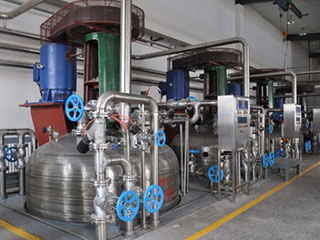Lab Fermenters & Its Advantageous

Strong 8k brings an ultra-HD IPTV experience to your living room and your pocket.
A lab fermenter, also known as a bioreactor or fermenter, is a specialized piece of equipment used in laboratories and biotechnological industries for the controlled cultivation of microorganisms, cells, or tissues under specific environmental conditions. It provides an ideal environment for the growth and production of various biological products, including microorganisms like bacteria, yeast, and fungi, as well as mammalian cells and plant cells.
Lab fermenters are designed to mimic the natural conditions required for the growth of the target organism, such as temperature, pH, dissolved oxygen levels, agitation, and nutrient supply. These parameters can be finely controlled and monitored throughout the fermentation process to optimize growth and maximize the yield of the desired product.
The main components of a lab fermenter typically include:
Vessel: A sterile container in which the biological material is cultivated. It can vary in size from small laboratory-scale fermenters to large industrial bioreactors.
Agitator or Stirrer: To ensure uniform mixing of the culture medium and prevent settling of cells or microorganisms.
pH and Dissolved Oxygen Probes: Sensors to measure and regulate pH and dissolved oxygen levels, as these are critical parameters affecting cell growth and product formation.
Temperature Control System: To maintain a constant temperature within the fermenter, as different microorganisms have specific temperature requirements.
Nutrient Supply System: A mechanism to continuously or periodically add nutrients to the culture medium to support microbial growth.
Foam Control System: As microbial fermentation can lead to the formation of foam; a foam control system is used to prevent overflow.
Advantages Of Lab Fermenter
Controlled Environment: Lab fermenters provide a tightly controlled environment for microbial growth. Parameters such as temperature, pH, aeration, agitation, and nutrient concentrations can be precisely regulated, ensuring optimal conditions for the growth and productivity of microorganisms.
Reproducibility: The ability to control various parameters in lab fermenters enhances experimental reproducibility. Researchers can repeat experiments with consistent conditions, leading to reliable and comparable results.
Scale Flexibility: Lab fermenters come in various sizes, allowing researchers to scale up or down their experiments as needed. This flexibility is valuable for process development and optimization, from small-scale lab studies to large-scale industrial production.
High Yield and Efficiency: With precise control over growth conditions, lab fermenters can achieve high yields and efficiencies in the production of valuable compounds, such as enzymes, pharmaceuticals, biofuels, and other biotechnological products.
Process Optimization: Lab fermenters facilitate the optimization of fermentation processes. Researchers can study the effects of different parameters on microbial growth and product formation, leading to the identification of the best conditions for maximum output.
Time-Saving: Using lab fermenters allows researchers to conduct experiments with higher throughput compared to traditional flask cultures. This accelerates the screening of various conditions and speeds up the research and development process.
Cost-Effectiveness: While lab fermenters require an initial investment, they can be cost-effective in the long run, especially for large-scale production of valuable products. The improved efficiency and yield contribute to reduced overall production costs.
Safety and Containment: Lab fermenters provide a safe and controlled environment for the cultivation of genetically modified organisms and pathogens. This containment ensures the safety of researchers and prevents accidental release into the environment.
Monitoring and Control: Modern lab fermenters are equipped with advanced monitoring and control systems, allowing real-time data collection and adjustment of parameters as needed. This real-time feedback enables researchers to respond quickly to changes in the fermentation process.
Versatility: Lab fermenters can be used for a wide range of applications, from biotechnology and pharmaceuticals to food and environmental sciences. Their versatility makes them valuable tools in various research and industrial settings.
Bioprocess Development: In biotechnology and pharmaceutical industries, lab fermenters are employed to optimize the growth conditions of microorganisms and to develop efficient bioprocesses for the production of valuable compounds, including enzymes, proteins, and antibiotics.
Vaccine Production: Lab fermenters play a crucial role in the large-scale production of vaccines, such as those used to combat viral diseases. They provide the necessary conditions for the growth of vaccine-producing microorganisms, which are then harvested and processed to create the vaccines.
Enzyme Production: Many industrial processes rely on enzymes as biocatalysts. Lab fermenters are used to cultivate microorganisms that produce specific enzymes, which are then extracted and used in various applications, such as food processing and biofuel production.
Antibiotic Production: Antibiotics are substances produced by microorganisms that can inhibit the growth of bacteria. Lab fermenters are used to cultivate antibiotic-producing bacteria or fungi, aiding in the large-scale production of antibiotics for medical use.
Biofuel Production: Lab fermenters are utilized in biofuel research to grow microorganisms capable of converting biomass into biofuels, such as bioethanol or biodiesel, through fermentation processes.
Food and Beverage Fermentation: Lab fermenters are employed in the development and optimization of fermentation processes for producing various food and beverage products, such as yogurt, beer, wine, and cheese.
Metabolic Engineering: Researchers use lab fermenters to study and modify metabolic pathways in microorganisms, enhancing their ability to produce desired products efficiently.
Environmental Applications: Lab fermenters are used in environmental research to study microbial interactions and degradation processes, helping to find solutions for waste treatment and pollution control.
Research and Development: Lab fermenters are essential tools for academia and industry alike, facilitating the study of microbial behavior, understanding cellular processes, and developing new biotechnological processes and products.Lab fermenters play a vital role in research, development, and production processes in various fields, including biotechnology, pharmaceuticals, food and beverage industries, and environmental sciences. They enable scientists and engineers to study and optimize the growth of microorganisms and cells for various applications, such as the production of vaccines, antibiotics, enzymes, biofuels, and many other biotechnological products.
Overall, lab fermenters are versatile tools that facilitate research, development, and production in various industries, ranging from pharmaceuticals and biotechnology to food and environmental sciences. Their controlled environments allow scientists and engineers to manipulate and monitor microorganisms efficiently, leading to advancements in diverse fields. Lab fermenters offer several advantages that make them essential tools in scientific research and industrial applications.
I hope this article will be helpful for you.
Note: IndiBlogHub features both user-submitted and editorial content. We do not verify third-party contributions. Read our Disclaimer and Privacy Policyfor details.


